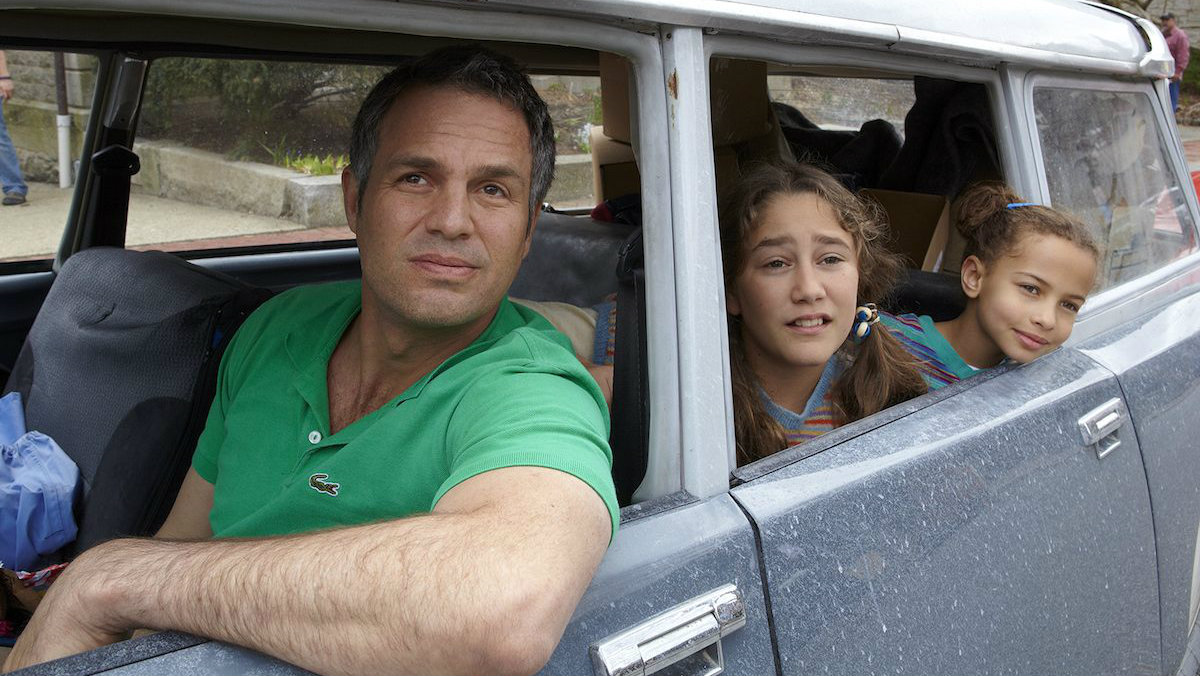 Sony Pictures Classics
Sony Pictures ClassicsAs the parents of a young man who has bipolar disorder—and who still lives in our basement when others his age are “launching” successfully—my wife and I often wonder and worry about a number of things: Will he ever be able to hold a full-time job? Will he ever be able to live independently? Will he ever marry and have a family?
Those are just the beginning. But our son, who also has Asperger's syndrome, also often surprises us, giving us glimpses of hope that yes, he’ll be okay.
Like tonight, when I was watching a press screener for a film to review for Christianity Today. Pete walked in and asked what I was watching.
“It’s a movie called Infinitely Polar Bear,” I told him.
“What’s it about?” he asked.
“A man who has bipolar disorder.”
Pete looked at the TV screen, and immediately recognized the lead actor.
“Hey,” he said, “that’s Mark Ruffalo. He’s the Hulk in the Avengers movies.”
“Yup.”
“I hope his bipolar in this movie isn’t as bad as when he’s the Hulk, or else his family’s in big trouble!”
We both had a good laugh, and then Pete walked away. I appreciated his astute observation, and it says so much about this movie, opening this week in limited release.
Ruffalo, one of our best actors, has proven that he can handle just about any role thrown his way. He can do blockbuster movie bipolar, as shown as Bruce Banner/Hulk in the Avengers movies. And he can do gritty little indie film bipolar, as he does so well here in Infinitely Polar Bear.
He doesn’t turn green, battle aliens, or yell “Hulk Smash!” in this movie. But he does turn blue (figuratively), battles inner demons, and yells at his wife and kids—all the while trying his hardest to keep his struggling marriage and dysfunctional family from falling apart . . . even as he’s doing just that. It may be Ruffalo’s finest role yet.
Infinitely Polar Bear is billed as a comedy, but I wouldn’t call it that. Yes, there’s a sweet storyline, some levity, and a few laugh-out-loud moments—and, considering the topic, the film could’ve gone much deeper and darker. Still, I’d bill it as a drama for its serious content, and because in general, bipolar is no laughing matter.
The film, set in the 1970s, is written and directed by Maya Forbes, who is basically telling the story of her own childhood in Cambridge, Massachusetts. When she was 6, her world imploded when her father, who had bipolar, had a series of manic breakdowns, leading to her parents’ separation. Her mother enrolled at Columbia Business School in New York, and came home on weekends to help with the family.
“I wrote Infinitely Polar Bear about this difficult time,” Forbes says. “My mother’s plan seemed crazy. My sister and I were sad and furious and ashamed of the way we lived. And yet, in the end, it worked. We became our own version of a family.”
 Claire Folger / Sony Pictures Classics
Claire Folger / Sony Pictures ClassicsForbes says she wanted “a film that was funny, sad, authentic, and warm. I wanted a humane film about the effects of mental illness on a family. I wanted to see real, resilient children. I wanted to see a movie about love and the hard choices people have to make every day.”
Forbes, a veteran writer, directs here for the first time, and she delivers on all the counts she had hoped for. The movie is everything she describes, thanks to believable performances by Ruffalo as Cameron, Zoe Saldana as his wife, Maggie, and Imogene Wolodarsky and Ashley Aufderheide as their young daughters, Amelia and Faith.
Saldana is the real surprise here. Known primarily for her action movie roles (Avatar, Star Trek, Guardians of the Galaxy), Saldana clearly has more range and depth than previously seen. As Maggie, she exudes the pain and pleasure of loving someone with bipolar disorder, and proves herself capable of taking on more challenging, multidimensional roles.
Wolodarsky is actually Forbes’ daughter, and is superb as the older of the two sisters, who are forced to grow up faster than they should when their mom’s away at school. She also has some of the film’s best lines, like when she’s visiting her dad in a halfway house after he’s had a nervous breakdown. While he putters around the house, talking incessantly and serving tea, Amelia says: “I feel like Lucy visiting Mr. Tumnus.” And then she turns serious: “I think if you stopped drinking and took your lithium, Mom would let you come back.”
It’s not something you expect to hear a 10-year-old girl say to her dad. But like I said, these kids had to grow up fast. (Those were the days when lithium was about the only option for people with manic depression, which is what they called it before the term “bipolar” came into play.)
As Cam, Ruffalo is convincing as a man with mental illness. In one scene, he’s in a psych ward, heavily drugged, almost zombie-like, talking slowly and slurring, hands shaking. I’ve seen that look before in real life, and Ruffalo nails it.
Throughout, he captures the mania and the depression, and everything in between. He’s an insensitive lout one minute, completely absorbed with himself. He’s a compassionate gentle soul the next, trying to placate his daughters or comfort his worried wife. He’s a chain smoker; there’s rarely a moment when a cigarette isn’t dangling from his lower lip. He’s an obsessive pack rat, always tinkering with unfinished projects. He’s rough around the edges, ruffled in appearance, and can’t stay focused on anything for long.
Cam’s daughters are utterly embarrassed by him, but the neighborhood kids think he’s oddly interesting. He often asks his girls why they don’t invite their friends over, and they tell him the truth: They’re ashamed of him, and their house is always a mess. Cam yells, “Tell your friends it’s not your fault! Tell them your father is manic depressive, or bipolar, or whatever they’re calling it these days! Don’t not have friends because of me!”
Apparently it works, and his daughters finally relent and invite some friends over. When they arrive, one sees the chaos and clutter and asks, “Why do you have so much stuff?” Eight-year-old Faith replies, “Our dad is totally polar bear.” Amelia corrects her, “You mean bipolar. He’s manic depressive.”
Their friends shrug their shoulders like, big deal, and they all have a grand time as Cam makes cinnamon toast, cracks jokes, and the kids play with a roulette wheel and other funky odds and ends. They’re loving it, and so is Cam.
 Seacia Pavao / Sony Pictures Classics
Seacia Pavao / Sony Pictures ClassicsWhich is kind of the point of the film. Bipolar disorder is a big deal, but once family and friends learn to just shrug their shoulders and live with it, relationships can thrive. Of course, they’ll have to buckle up for the ride, because the road is winding and full of bumps and potholes. But it can work, and often does.
Infinitely Polar Bear illustrates those realities in a narrative that is basically a series of somewhat unconnected scenes, the common thread being a dysfunctional family simply trying to make it work. But you know, we’re all from dysfunctional families; I’ve never met a perfect one. And without patience, grace, and forgiveness, no family can truly “work” well. We might not all have to deal with a mentally ill family member, but we’re all fallen wretches who need common grace to make it through the day.
That’s the best thing about Infinitely Polar Bear. It’s a deeply moving portrait of a family that could’ve blown up and fallen apart, but didn’t. Because, well, love. And lots of it. Which covers a multitude of things, and makes broken families whole again.
Caveat Spectator
Infinitely Polar Bear is rated R for language. There’s quite a bit of cursing, especially from Ruffalo’s character, including a number of f-bombs. His daughters pick up a bit of the foul language, particularly when they refer to their always messy home as a “s—hole.” And there’s a somewhat disturbing scene near the beginning of the film where Cam has a nervous breakdown, and his frightened family locks themselves in the car.
Mark Moring, a writer in Atlanta, is the father of a young adult with bipolar disorder and Asperger's syndrome, so he tries to catch movies tackling either of those themes. For bipolar films, he recommends Infinitely Polar Bear, Silver Linings Playbook, and the documentary The Devil and Daniel Johnston. For Asperger’s films, he recommends Adam and Phoebe in Wonderland.












